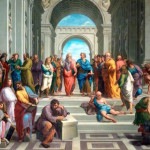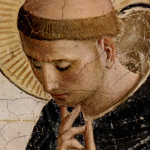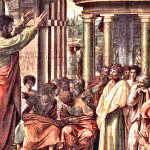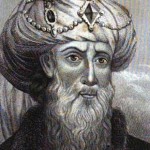What is Classical Theism?
by Thomas M. Cothran
Filed under The Existence of God
NOTE: This is the first of a three part series on classical theism by theologian Thomas M. Cothran.
Over the last few years, Stephen H. Webb has waged a crusade of sorts against classical theism, especially with respect to its notion of divine transcendence. Webb has authored, by my count, no less than 10 articles on the subject at First Things1, and similar critiques have also been central to his books Mormon Christianity and Jesus Christ, Eternal God. Perhaps surprisingly, Webb is not an atheist. He is a philosopher and theologian, and a Roman Catholic.
To hear Webb tell it, the core tenets of classical theism are foreign to Christianity, emigres of Greek extraction. Webb concedes that the mainstream Christian view since the Patristic era has been classically theist. He suggests, however, that this consensus was established by “elite theologians” because of their “embarrassment” of more original but less sophisticated Christian doctrines. At this decisive and distant moment in history, elite theologians opted for Plato against Paul.
The classical notion of God which emerges from this Hellenic, Jewish, and Christian synthesis is, on Webb’s account, inconsistent (or at least sits ill at ease) with traditional Christological and Trinitarian dogma. Moreover, classical theism’s insistence on God’s transcendence rests on a scientifically outmoded and philosophically defective view of matter.
Webb therefore levels two distinct charges:
Theological charge: classical theism’s assertion of divine transcendence is incongruent with Christian doctrine.
Philosophical charge: classical theism’s assertion that God transcends matter is based on an antiquated notion of matter.
Although Webb is a religious believer, atheists may be tempted to coopt some of his arguments to the service of anti-theist polemic. If the classical notion of God—that is, God with an capital G, rather some object in the universe—can be eliminated, then the remaining gods will quickly topple with the merciless onslaught of the empirical sciences. If Webb’s critique of classical theism is right, then most mainstream religious traditions have been, at a stroke, debunked—along with the main thrust of the classical Western metaphysical traditions.
And, while atheists will not agree with Webb’s theology, his theological argument that Christianity and classical theism do not agree with one another directly serves the anti-theist cause. For if Webb is right, Christians can be separated from the theistic herd and, deprived of its intellectual resources, made easy prey. After all, if Christians do not subscribe to divine transcendence, then they (unlike classical theists) cannot entirely avoid the stereotyped notion of God as a bearded man in the sky, or a glorified extra-terrestrial.
Faulty notions that originate within Christian theology often migrate to the secular world. For example, the voluntarist notion of freedom—unconstrained choice—originated in debates about God’s omnipotence but migrated to political philosophy with—to my mind—some unfortunate and overlooked consequences. My purpose in this three part series, then, is simply to caution atheists against the effects of taking up certain theological castoffs. The attempt to present classical theism as an academic luxury divorced from any organic connection to living faith runs contrary to both Christian history and the substance of Christian beliefs.
Classical Theism Defined
What is classical theism? Classical theism refers very generally to the way most of the great theological and philosophical traditions have conceived God: as the cause of all finite being, the ground of the good, eternal, immutable, transcendent of space and time, perfect, omnipotent, immaterial, infinite, and omniscient.
These very general lines are, of course, construed differently in the various traditions, but the general picture stands out clearly. Classical theism is perhaps most readily explicable by its negations: God is not a being that has come to be, he does not change, he is not limited by space or time, nor indeed limited in any way. God is not an effect, he does not depend on anything more fundamental. God is not a finite spirit flitting about the cosmos like a ghost; he is not a being differentiated from other beings simply by a greater degree of power or knowledge. God’s mode of existence differs from ours as the infinite to the finite.
This view is, by and large, held by the mainstream of the Jewish, Christian, and Muslim traditions; it is the common inheritance of the most influential classical forms of the Western metaphysical traditions; and it may be found by many forms of Hinduism, Taoism, and certain quarters of Buddhism.
By identifying these similarities, however, I certainly do not mean to give the impression that classical theism is a single tradition. It is a post-hoc identification of the convergence on a general sense of what is meant by “God.” Not every classical theist affirms everything I’ve listed (certain Greek thinkers didn’t think of God as infinite, for example.) And even while agreeing on the general marks of divinity, how those are construed differs even within particular religious traditions. God’s omnipotence, even within medieval Catholic theology, was construed very differently by Aquinas and Occam. Careful thinkers avoid reducing classical theism to one of its articulations.
Still less does classical theism entails a particular ontology—whether Platonist, Aristotelian, Thomist, Hegelian, Vedantic etc. There is no “classical theist” theory of being or of matter. Classical theism is a common notion of God abstracted from the great religious and philosophical traditions. It is not a single school of metaphysical thought.
Despite these differences between concrete religions and philosophical traditions, the convergent belief that all finite being depends on an eternal, omnipresent, omnipotent, and transcendent source—God with a capital “G”—is strong enough to identify classical theism and to talk about it coherently.
What Does Webb Think Classical Theism Is?
What I have just said about classical theism should be entirely uncontroversial. Unfortunately, Webb’s portrayal of classical theism is tendentious, inaccurate, and often unrecognizable.
Consider Webb’s essay “Is God More Like A Rock Or The Idea of a Rock?” Webb characterizes “classical theism [as] a formidable consensus that includes Plato, Origen, Augustine, and Aquinas.” Webb explains classical theism in terms of the following dilemma:
Is God more like a rock or the idea of a rock? If you had to choose one or the other, which would it be? … Rocks represent matter at its most obdurate state, while ideas transcend matter altogether. Ideas are the proper activity of the intellect. They live in minds, while rocks don’t live at all.
Classical theism takes the option that God is “much more like an idea of a rock than a rock,” because classical theists deny that God is a discrete being in the world. For classical theists, “God is absolutely simple, immaterial, and indivisible…. That makes God much more like an idea of a rock than a rock.”
Classical theists conception of God as more mental than real is accompanied by an eschatology.
All physical things, according to classical theism, will come to an end when God is all in all, because matter, being formless, is the absence of the divine…. We will arrive in eternity to find ourselves in the mind of God. There will be no bodies, or persons, since persons are bodies with their own individual thoughts. Needless to say, God will no longer think about rocks, or even the idea of a rock, since God’s thinking is identical to his creating. Will God even, in the end, think about us?
This description of classical theism is so idiosyncratic that neither Plato, Aristotle, Augustine, Aquinas, nor even Origen would count. Aristotle fails to qualify because he regards the physical world as eternal; Aquinas, Origen,2 and Augustine because they, like all orthodox Christians, believe in the resurrection of the body; Plato because he regards pure being as second in the metaphysical order. Indeed, if Webb has mapped out the criteria to be a classical theist, then it appears that “classical theists,” like their God, exist only in the imagination.3
Where, then, does Webb’s “classical theism” come from? Webb has cobbled together notions from a broad variety of thinkers—pagans, Christians, Platonists, neo-Platonists, Thomists,—into a sort of Frankensteinian theism. Webb’s description of classical theism eschatology mixes more or less at random the Christian scriptural tradition (”when God is all in all”) with Plotinian eschatology, Platonic and Aristotelian notions of matter, and elements of subjective idealism. The result is a set of doctrines that bear no organic relation to one another and that is not actually held together by any real thinker. The difficulties and incoherences Webb notices in the resulting Frankenstein results from its piecemeal creation in Webb’s writings, but are not often present in any particular theist’s articulation of his beliefs.
But one does not need to know the ins and outs of the history of metaphysics or the distinction between real and intentional being to know something is wildly off with Webbs’ account. And the initial implausibility descends to patent absurdity upon reflection. Someone who regards something as existing mentally but not really thinks of it as imaginary. When I think of Sisyphus’ stone as having mental but not real existence, I think of it as imaginary. This is not to say that I think of Sisyphus’ stone as mental rather than real and that I also think of it as imaginary. To believe something has mental but not real existence is just what it means to hold something as being imaginary. As with Sisyphus’ stone, so with God. If Webb is right about what classical theists believe God to be, then classical theists advocate belief in a God they themselves think of as imaginary (or at least more imaginary than real).
Some of the trouble seems to arise from Webb’s misunderstanding of how the classical tradition uses the word “Idea” (eidos). Webb is very specific about what he understands “ideas” to be: the sort of things that “live in minds.” Rocks, on the other hand, exist independently of our minds. But this is not at all how classical theists use the term “idea.” “Idea” is a term of art in Greek philosophy. The Platonic tradition uses “idea” to refer to a subsistent form; that is, a form that exists independently of both our minds and of matter. The Oxford Guide to Philosophy, for example, points out that our modern notion of idea as “entities that exist only as contents of some mind … must be distinguished from Plato’s Ideas or Forms, which are non-physical but exist apart from any conscious beings.”4
For the Aristotelian tradition, on the other hand, the eidos exists as a form typically (though not always) in composition with matter. In no case does “idea” refer primarily to a concept living in our minds, as Webb thinks.
Webb’s account confuses classical theism with contemporary religious non-realism—namely, the notion that there really is no God outside how we choose to think of the world. When one has conflated Thomas Aquinas with Don Cupitt, one has left the realm of the history of ideas altogether.
NOTE: Stay tuned for part two of this series on Wednesday.
Related Posts
Notes:
- Stephen H. Webb’s author page may be found at https://www.firstthings.com/featured-author/stephen-h-webb ↩
- Origen clearly taught that the resurrected would have bodies in eternity. “Let no one, however, suspect that, in speaking as we do, we belong to those who are indeed called Christians, but who set aside the doctrine of the resurrection as it is taught in Scripture.” See e.g., Contra Celsus V.22 ↩
- Webb may have had Plotinus in mind with the claim about the final annihilation of matter—though he does not mention him—but Plotinus would have been excluded because, as for many Platonists, being is for him subsequent to the One in the philosophical order. ↩
- Ted Honderich, ed.,The Oxford Guide to Philosophy, p. 416 (2005, 2nd ed.) ↩
Note: Our goal is to cultivate serious and respectful dialogue. While it's OK to disagree—even encouraged!—any snarky, offensive, or off-topic comments will be deleted. Before commenting please read the Commenting Rules and Tips. If you're having trouble commenting, read the Commenting Instructions.













